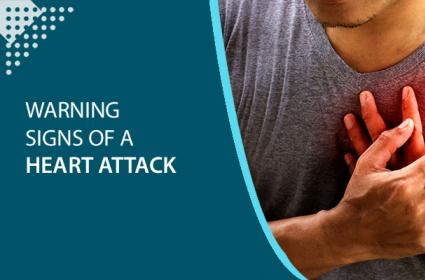10 Warning Signs Of Heart Attack

Although not all heart issues have noticeable symptoms, it is vital to be aware of the most prevalent ones.
The World Health Organization (WHO) has issued a warning about the rising number of deaths caused by heart disease.
10 Warning Signs Of Heart Attack: Caring for your heart is critical since it is one of the most essential organs in the body. The heart is responsible for keeping you alive by pumping blood to all of your other organs. The entire system may fail if the heart stops working. That is why it is critical to get frequent check-ups to ensure that the organ is in good working order.
Although not all heart issues have obvious symptoms, it is vital to be aware of the most common ones so that you can identify even the tiniest shift or anomaly and get medical help as soon as possible to avoid the condition from deteriorating.
Keep an eye out for these ten warning symptoms of a failing heart.
Chest Discomfort
This is one of the most prevalent symptoms that your heart is at risk. When you have a clogged artery or are experiencing a heart attack, you may feel tightness, discomfort, or pressure in your chest. The symptoms might happen when you're sleeping or doing anything active, and they generally only last a few minutes. The pain is just temporary, and when touched or pushed, the area where you're hurting aches more. A Heart attack can happen without chest discomfort in some circumstances, especially in women.
Nausea, Indigestion, And Heartburn
During a heart attack, some people may suffer from nausea, indigestion, heartburn, or stomach discomfort. These signs and symptoms might also be accompanied by vomiting. As a result, a heart attack is frequently misdiagnosed as indigestion. Similarly, gastrointestinal problems can occur for a variety of reasons, but you should be aware that they might potentially indicate a heart attack.
Radiating Pain
A discomfort that extends downhill on the left side of the body is another typical symptom of heart disease. It generally starts in the chest and spreads out to the arms. Arm discomfort may potentially be a sign of a cardiac problem.
Fainting, Dizziness, Or Lightheadedness
Everyone has experienced fainting or dizziness at some point in their lives. While fainting can occur for a variety of reasons, including heat from the sun, poor ventilation, rising too quickly from a sitting or lying down position, anxiety, or shock, it can also indicate something more serious, such as a drop in blood pressure, if it is accompanied by chest discomfort or shortness of breath. This can cause problems with the heart's capacity to pump blood.
Pain In The Throat Or Jaw
A muscle problem, a cold, or a sinus infection are the most prevalent causes of throat or jaw pain. If you have pain or discomfort in your chest that extends to your jaw or neck, you may be having a heart attack.
Fatigue
Another symptom of a cardiac issue is exhaustion. If you feel tired after doing something that was previously not a problem for you, such as ascending the stairs or carrying groceries, it might indicate a problem. Excessive tiredness or inexplicable weakness, which can last for days, might be a sign of heart disease, particularly in women.
Snoring
During sleep, particularly high snoring that sounds like gasping or chuckling is typical, but it might be an indication of sleep apnea when breathing is stopped during short sleep times. This puts your heart under additional strain, leading to cardiac issues.
Sweating
A heart attack might be detected by breaking out in a cold sweat for no apparent reason. If this occurs in conjunction with any of the aforementioned symptoms, get medical attention at once!
Irregular Or Abnormal Heartbeat
It's often when you are frightened or thrilled that you sense your heart rushing or fast pounding, but it might signal a problem if this goes on for over a few seconds. A disease known as 'atrial fibrillation' (an erratic, sometimes fast heart rhythm that usually causes poor blood flow) can lead to blood clots, stroke, heart failure, and other heart-related issues if you skip a beat or two for an extended length of time or regularly.
Swelling Of Body Parts
Swelling in the legs, ankles, and feet might suggest that your heart isn't pumping blood as efficiently as it should be. This causes bloating by causing blood to back up in the veins. Bloating can occur if your kidney's filtration ability to eliminate extra water and salt is harmed as a result of heart failure.


















